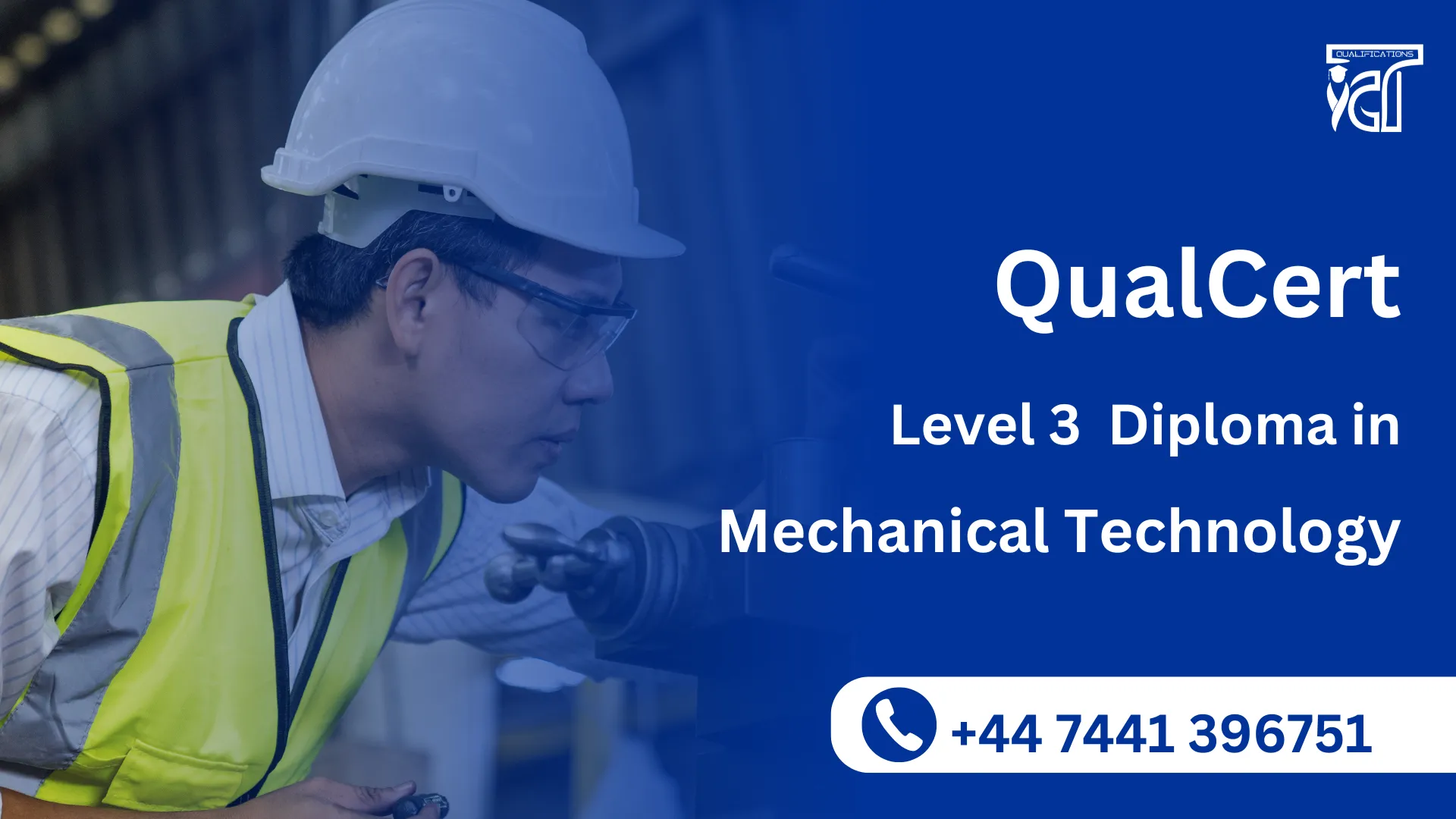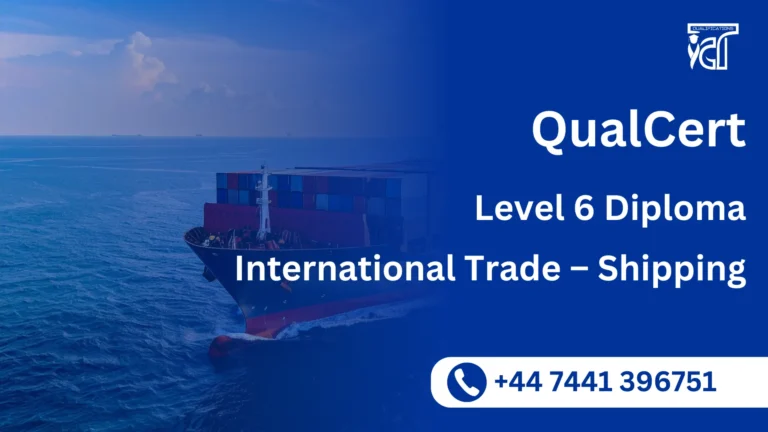In today’s rapidly evolving industrial landscape, mechanical engineering remains one of the most sought-after fields. For individuals aspiring to enter this dynamic sector or progress in their current technical roles, the QualCert Level 3 Diploma in Mechanical Technology offers a robust pathway to achieving those goals. Recognized for its comprehensive curriculum and industry relevance, this qualification provides the essential skills and knowledge needed to thrive in mechanical and manufacturing environments.
The QualCert Level 3 Diploma in Mechanical Technology is a nationally recognized vocational qualification designed to equip learners with advanced technical competencies in mechanical engineering. Developed by QualCert, a reputable awarding body in vocational training, this diploma focuses on practical skills, safety protocols, theoretical knowledge, and hands-on experience in mechanical systems.
Unlike purely academic qualifications, the QualCert Level 3 Diploma emphasizes experiential learning. Many training providers offer work-based assessment models, allowing learners to demonstrate competence in real-world scenarios, which enhances both technical skill and employer trust.
The program includes comprehensive training on UK and international mechanical safety regulations. This ensures learners not only meet legal requirements but also promote safer workplace environments—an essential aspect for employers across industrial sectors.
The QualCert Level 3 Diploma in Mechanical Technology stands as a cornerstone for those committed to developing a successful career in mechanical engineering. Its balance of theory, practical training, and industry relevance makes it one of the most effective qualifications for aspiring technicians and engineers.
Whether you’re an individual looking to enhance your technical capabilities or an employer aiming to upskill your workforce, this diploma offers long-term value, competitive advantage, and a pathway to continued professional development in the engineering sector.
QualCert Level 3 Diploma in Mechanical Technology
The QualCert Level 3 Diploma in Mechanical Technology is a 40 credits qualification with a Total Qualification Time (TQT) of 400 hours, including 200 Guided Learning Hours (GLH). This course is thoughtfully designed to provide targeted and efficient skill development in the field of Mechanical, offering learners a solid foundation to build their expertise.
| Unit Ref# | Unit Title | Credit | GLH | TQT |
| QC03003 – 1 | Advanced Manufacturing Techniques | 7 | 35 | 70 |
| QC03003 – 2 | Mechanics of Machines | 6 | 30 | 60 |
| QC03003 – 3 | Thermal Systems & Refrigeration | 6 | 30 | 60 |
| QC03003 – 4 | Robotics & Automation | 7 | 35 | 70 |
| QC03003 – 5 | Mechatronics Fundamentals | 7 | 35 | 70 |
| QC03003 – 6 | Project Management & Engineering Economics | 7 | 35 | 70 |
GLH (Guided Learning Hours) and TQT (Total Qualification Time) are terms commonly used in vocational qualifications to help define the amount of time a learner is expected to spend on their studies.
1. GLH (Guided Learning Hours)
GLH refers to the number of hours a learner spends being directly taught, supervised, or supported during their course. This includes the time spent in activities such as:
- Classroom instruction
- Practical workshops
- One-on-one tutoring or mentoring sessions
- Online learning sessions with tutor support
In other words, GLH represents the time that learners are actively engaged with their instructors or learning activities.
2. TQT (Total Qualification Time)
TQT represents the total amount of time a learner is expected to invest in completing a qualification, including:
- GLH (Guided Learning Hours): Time spent on direct learning, as explained above.
- Self-Directed Learning: This includes time spent on independent study, research, assignment completion, preparation for exams, and any other work the learner does outside of direct teaching hours.
TQT is a broader measure that includes all the time required to achieve the qualification. It helps learners and employers understand the overall commitment required for the qualification.
Key Differences Between GLH and TQT:
- GLH focuses on direct learning with guidance or supervision.
- TQT includes GLH as well as independent study time and other learning-related activities.
Example:
If a qualification has a TQT of 600 hours and a GLH of 250 hours, it means the learner should spend 250 hours in direct learning (classroom, online, or tutor-led sessions) and 350 hours on independent study or research.
Upon successful completion of the QualCert Level 3 Diploma in Mechanical Technology, students will have:
Advanced Manufacturing Techniques
- Understand the principles of advanced manufacturing methods and technologies.
- Gain proficiency in using modern manufacturing processes such as additive manufacturing, precision machining, and laser cutting.
- Evaluate the role of automation and computer numerical control (CNC) in enhancing manufacturing efficiency.
- Develop the ability to assess material properties and select the appropriate manufacturing technique for different products.
- Learn how to optimize production processes to improve quality and reduce costs.
Mechanics of Machines
- Understand the fundamental principles of machine mechanics, including motion, forces, and energy.
- Analyze the behavior of mechanical systems and their components under different loads and conditions.
- Apply principles of kinematics and dynamics to design and troubleshoot machinery.
- Learn how to evaluate the efficiency of mechanical systems and propose improvements.
- Gain the ability to use simulation tools for modeling mechanical systems and analyzing their performance.
Thermal Systems & Refrigeration
- Understand the fundamental principles of thermodynamics as they apply to thermal systems and refrigeration.
- Learn how to design and optimize heating, cooling, and ventilation systems.
- Gain practical knowledge of refrigeration cycles, heat exchangers, and cooling technologies.
- Analyze the efficiency and environmental impact of different thermal systems.
- Develop the ability to troubleshoot common problems in thermal and refrigeration systems.
Robotics & Automation
- Gain knowledge of robotics systems, including sensors, actuators, and control systems.
- Understand the principles behind automation technologies and their integration into industrial processes.
- Learn how to program and operate industrial robots for various tasks such as assembly, welding, and material handling.
- Evaluate the benefits and challenges of automation in modern manufacturing environments.
- Develop the ability to design and implement robotic solutions to improve productivity and safety.
Mechatronics Fundamentals
- Understand the interdisciplinary nature of mechatronics, combining mechanical engineering, electronics, and computer science.
- Learn how to design and integrate mechanical, electrical, and software components in mechatronic systems.
- Gain practical experience in controlling and automating mechanical systems through embedded systems and sensors.
- Develop problem-solving skills for diagnosing and troubleshooting mechatronic systems.
- Understand the applications of mechatronics in industries such as manufacturing, robotics, and automotive engineering.
Project Management & Engineering Economics
- Learn the key principles of project management, including planning, scheduling, and resource management.
- Understand the application of engineering economics to assess project feasibility and financial implications.
- Develop skills to manage engineering projects effectively, ensuring timelines, budgets, and quality standards are met.
- Learn to evaluate the cost-benefit analysis of engineering projects and make informed financial decisions.
- Gain the ability to manage teams and communicate effectively with stakeholders throughout the project lifecycle.
Key Benefits of the QualCert Level 3 Diploma in Mechanical Technology
1. Industry-Relevant Skill Development
This diploma equips learners with up-to-date technical skills in areas such as mechanical assembly, precision machining, CAD/CAM systems, and maintenance engineering—skills that are in high demand across manufacturing and engineering industries.
2. Nationally Recognized Qualification
The QualCert Level 3 Diploma is a formally accredited qualification aligned with national vocational standards. It is widely respected by employers and educational institutions, adding credibility and value to your professional profile.
3. Career Advancement Opportunities
Successful completion of the course can lead to job roles such as Mechanical Technician, Maintenance Engineer, CNC Operator, or Production Supervisor. It also opens pathways to higher qualifications like HNCs, HNDs, or engineering degrees.
4. Work-Based Learning and Flexibility
The qualification emphasizes practical, hands-on learning, with many providers offering flexible delivery formats, including part-time, workplace-based, and blended learning options. This makes it suitable for both new learners and working professionals.
5. Enhanced Employability
Graduates of this program are highly employable due to the technical competency and safety awareness gained during the course. Employers value candidates who are job-ready and can contribute immediately in technical roles.
6. Strong Foundation in Health and Safety Compliance
The diploma includes comprehensive training in workplace safety, ensuring learners understand and apply essential health and safety standards, which is critical in any engineering environment.
7. Pathway to Professional Recognition
This qualification supports progression toward professional registration with engineering bodies such as the Engineering Council (UK) at Engineering Technician (EngTech) level, enhancing your long-term career prospects.
8. Develops Problem-Solving and Analytical Skills
The curriculum focuses not only on technical ability but also on fostering critical thinking, troubleshooting, and real-time problem-solving—skills crucial in mechanical and maintenance engineering roles.
9. Customizable for Employer Needs
For companies, this diploma can be delivered as part of employee upskilling programs, tailored to meet specific operational needs and improve workforce capability.
10. Accessible Entry Point for Aspiring Engineers
The diploma serves as a practical, cost-effective entry route into the mechanical engineering profession for school leavers, career changers, and technical apprentices.
The “QualCert Level 3 Diploma in Mechanical Technology” is tailored for a select group of individuals who are passionate about advancing their expertise in mechanical engineering and technology. This course is ideally suited for:
- Level 2 Diploma Graduates: If you’ve successfully completed the Level 2 Diploma in Mechanical Technology, this course serves as the next logical step in your academic and professional journey. It offers an opportunity to deepen your knowledge and practical skills in the field.
- Experienced Engineers and Technicians: For professionals already working in mechanical engineering or related fields, this diploma provides an avenue to enhance their skill set, take on leadership roles, and gain formal qualifications for career advancement.
- Academic Enthusiasts: Students with a strong academic background in mechanical engineering or related disciplines who wish to pursue advanced studies and specialization in the field will find this course an excellent choice.
- Innovators and Researchers: Individuals with a passion for innovation, research, and development in mechanical technology can use this diploma as a springboard for pursuing cutting-edge projects and contributing to technological advancements.
- Career Changers: If you’re considering a career change into the dynamic world of mechanical technology and engineering, this course offers the advanced knowledge and skills required to make a successful transition.
Entry Requirements
Register Now
Qualification Process
Qualification Process for the QualCert Level 3 Diploma in Mechanical Technology
- Self-Assessment:
Begin by evaluating your eligibility to ensure you meet the qualification requirements, including work experience, knowledge, and language proficiency. - Registration:
Complete your registration by submitting the required documents, including a scanned copy of a valid ID, and paying the registration fee. - Induction:
An assessor will conduct an induction to confirm your eligibility for the course and explain the evidence requirements. If you do not meet the criteria, your registration will be canceled, and the fee will be refunded. - Assignmnets & Evidence Submission:
Provide all assignmnets and the necessary evidence based on the assessment criteria outlined in the course. If you are unsure of the required evidence, consult with the assessor for guidance on the type and nature of evidence needed. - Feedback and Revision:
The assessor will review your submitted evidence and provide feedback. Evidence that meets the criteria will be marked as “Criteria Met,” while any gaps will be identified. You will be asked to revise and resubmit if needed. - Competence Evidence:
Submit final evidence demonstrating that all learning outcomes have been met. This evidence will be marked as “Criteria Met” by the assessor once it is satisfactory. - Internal Quality Assurance (IQA):
The Internal Quality Assurance Verifier (IQA) will review your evidence to ensure consistency, quality, and compliance with standards. - External Verification:
The IQA will submit your portfolio to QualCert External Quality Assurance Verifiers (EQA) for final confirmation. The EQA may contact you directly to verify the authenticity of your evidence. - Certification:
Upon successful completion of all checks, QualCert will issue your official certificate, confirming that you have attained the QualCert Level 3 Diploma in Mechanical Technology.







